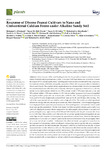Mostrar o rexistro simple do ítem
Response of Diverse Peanut Cultivars to Nano and Conventional Calcium Forms under Alkaline Sandy Soil
| dc.contributor.author | El-temsah, Mohamed E. | |
| dc.contributor.author | Abd-Elkrem, Yasser M. | |
| dc.contributor.author | Abd El-Gawad El-Gabry, Yasser | |
| dc.contributor.author | Abdelkader, Mohamed | |
| dc.contributor.author | Morsi, Nahid A. A. | |
| dc.contributor.author | Taha, Noura | |
| dc.contributor.author | Abd-Elrahman, Shaimaa | |
| dc.contributor.author | Hashem, Fadl | |
| dc.contributor.author | Shahin, Mostafa G. | |
| dc.contributor.author | Abd El-Samad, Gomaa A. | |
| dc.contributor.author | Boudiar, Ridha | |
| dc.contributor.author | Silvar, Cristina | |
| dc.contributor.author | El-Hendawy, Salah | |
| dc.contributor.author | Mansour, Elsayed | |
| dc.contributor.author | Abd El-hady, Mohamed | |
| dc.date.accessioned | 2023-11-14T20:57:33Z | |
| dc.date.available | 2023-11-14T20:57:33Z | |
| dc.date.issued | 2023-07-09 | |
| dc.identifier.citation | El-temsah, M.E.; Abd-Elkrem, Y.M.; El-Gabry, Y.A.; Abdelkader, M.A.; Morsi, N.A.A.; Taha, N.M.; Abd-Elrahman, S.H.; Hashem, F.A.E.; Shahin, M.G.; Abd El-Samad, G.A.; et al. Response of Diverse Peanut Cultivars to Nano and Conventional Calcium Forms under Alkaline Sandy Soil. Plants 2023, 12, 2598. https://doi.org/10.3390/plants12142598 | es_ES |
| dc.identifier.issn | 2223-7747 | |
| dc.identifier.uri | http://hdl.handle.net/2183/34217 | |
| dc.description | This article belongs to the Special Issue Plant Nutrition Volume II | es_ES |
| dc.description.abstract | [Abstract] Calcium is one of the most limiting factors for the growth and reproduction of peanut, which ultimately affects pod and seed yields. A two-year field experiment was carried out to assess the impact of five calcium applications, including nano-calcium and conventional forms, on growth, leaf nutrient content, yield traits, and quality parameters of three diverse peanut cultivars (Ismailia-1, Giza-5, and Giza-6). The applied calcium applications were calcium sulfate, which is recommended for commercial peanut cultivation and commonly referred to as gypsum (coded as Ca-1), calcium nitrate (Ca-2), nano-calcium nitrate (Ca-3), 50% calcium nitrate + 50% nano-calcium (Ca-4), and 50% calcium sulfate + 50% nano-calcium (Ca-5). Calcium sulfate (gypsum, Ca-1) was soil-supplied during the seedbed preparation as recommended, while the other calcium applications (Ca-2, Ca-3, Ca-4, and Ca-5) were exogenously sprayed three times at 30, 45, and 60 days after sowing. The soil of the experimental site was alkaline, with a high pH of 8.6. The results revealed significant differences among cultivars, calcium applications, and their interactions. The soil-supplied gypsum Ca-1 displayed lower agronomic performance on all recorded growth, leaf nutrient content, yield traits, and quality parameters. On the other hand, the foliar-supplied calcium, particularly Ca-4 and Ca-5, displayed superior effects compared to the other simple calcium forms. Ca-4 and Ca-5 produced significantly higher seed yield (3.58 and 3.38 t/ha) than the simple recommended form (Ca-1, 2.34 t/ha). This could be due to the difficulty of calcium uptake from soil-supplied calcium under high soil pH compared to the exogenously sprayed nano-calcium form. Moreover, the superior performance of Ca-4 and Ca-5 could be caused by the mixture of fertilizers from the synergistic effect of calcium and nitrate or sulfate. Furthermore, the effect of nitrate was applied in nano form in the Ca4 and Ca-5 treatments, which contributed to improving nutrient uptake efficiency and plant growth compared to the other treatments. The peanut cultivar Giza-6 showed superiority for most measured traits over the other two cultivars. The interaction effect between the assessed cultivars and calcium applications was significant for various traits. The cultivar Giza-6 showed a significant advantage for most measured traits with the mixture of 50% calcium nitrate + 50% nano-calcium (Ca-4). Conclusively, the results pointed out the advantage of the exogenously sprayed nano-calcium form combined with calcium nitrate or calcium sulfate for promoting growth, leaf nutrient content, yield, and quality traits of peanut, particularly with high-yielding cultivars under sandy soil with high pH. | es_ES |
| dc.description.sponsorship | This research was funded by the Deputyship for Research and Innovation, “Ministry of Education”, in Saudi Arabia, research number (IFKSUOR3-106-3) | es_ES |
| dc.description.sponsorship | Arabia Saudí. Ministry of Education; IFKSUOR3-106-3 | es_ES |
| dc.language.iso | eng | es_ES |
| dc.publisher | MDPI | es_ES |
| dc.relation.uri | https://doi.org/10.3390/plants12142598 | es_ES |
| dc.rights | Atribución 4.0 International | es_ES |
| dc.rights.uri | http://creativecommons.org/licenses/by/4.0/ | * |
| dc.subject | Nanoscale fertilizer | es_ES |
| dc.subject | High pH | es_ES |
| dc.subject | Calcium fertilizer | es_ES |
| dc.subject | Peanuts yield | es_ES |
| dc.subject | Oil | es_ES |
| dc.subject | Pod | es_ES |
| dc.subject | Protein | es_ES |
| dc.title | Response of Diverse Peanut Cultivars to Nano and Conventional Calcium Forms under Alkaline Sandy Soil | es_ES |
| dc.type | info:eu-repo/semantics/article | es_ES |
| dc.rights.access | info:eu-repo/semantics/openAccess | es_ES |
| UDC.journalTitle | Plants | es_ES |
| UDC.volume | 12 (2023) | es_ES |
| UDC.issue | 14 | es_ES |
| UDC.startPage | 2598 | es_ES |
| dc.identifier.doi | 10.3390/plants12142598 |
Ficheiros no ítem
Este ítem aparece na(s) seguinte(s) colección(s)
-
GI-GIBE - Artigos [83]






